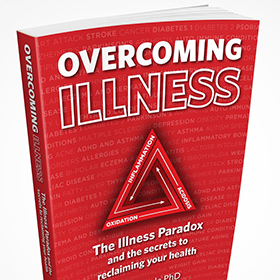
The link between chronic inflammation and cancer has long been recognised since the 19th century when German pathologist Rudolph Virchow first hypothesized that the origin of cancer was at sites of chronic inflammation. Now it seems that modern science has caught up with the observations of the 19th century.
Dr. Otto Warburg discovered that cancer cannot thrive in an alkaline medium and the interstitial fluid of tumours has shown pH values of less than 6.0, 0.2–0.6 units lower than mean pH of normal tissues (very acidic). In fact, as a result of only partial metabolism of glucose, a major byproduct of cancers is even higher acidic levels and a requirement for a lot more glucose than other cells. Cancers do this by dumping extra acid in the surrounding tissue and increasing specialty sugar transporters (GLUT1 and GLUT3), and altering insulin levels to get more glucose into the cells.
Cancers occurs at sites of chronic inflammation. In 2005 Prof. Houghton and her colleagues found that an infection with Helicobacter felis (a bacterium related to infectious Helicobacter pylori in humans), which causes a large amount of inflammation and oxidation, leads to an influx of bone marrow-derived stem cells (BMDCs), as the body tries to repair the injury caused by the infection. Researchers were able to show that this transformation of BMDCs is the event that actually sparks malignant tumours of the stomach. They showed that bone marrow-derived stem cells attempt to participate in repair but, under conditions of inflammation and oxidation, are unable to behave normally and instead progress toward becoming cancerous cells themselves.
BMDCs have many cancer-like properties, including: the capacity for unlimited growth and the ability to avoid apoptosis (programmed cell death) signals. These properties give them a significant growth advantage, making them difficult to control once they have mutated.
In 2010, more pieces of the puzzle came together when researchers reported they could definitively show that inflammation in the breast is key to the development and progression of breast cancer. In an earlier study, women with high levels of two markers of inflammation—C-reactive protein and serum amyloid A—were two to three times more likely to die early or have their cancer return than women with lower levels.
Now there is a large body of evidence that chronic inflammation is involved in all stages of cancer development. Inflammation affects the microenvironment of the cancer; it increases malignant growth may alter blood flow processes; and the cancer’s response to remedial substances and hormones. Animal testing provides strong evidence that chronic inflammation contributes to the promotion of cancer and through suppression of the immune system it allows the outgrowth and proliferation of malignant cells.
“Overcoming Illness” the book
https://www.drdingle.com/collections/frontpage/products/overcoming-illness-pre-order